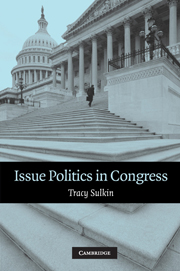Book contents
- Frontmatter
- Contents
- List of Figures
- List of Tables
- Acknowledgments
- Issue Politics in Congress
- 1 Electoral Challenges and Legislative Responsiveness
- 2 A Theory of Issue Uptake
- 3 The Nature of Campaign and Legislative Agendas
- 4 Assessing Uptake
- 5 Who Responds? Explaining Individual Variation in Uptake
- 6 Patterns of Responsiveness in Congress
- 7 The Electoral Impacts of Uptake
- 8 Uptake and Public Policy
- 9 Elections, Governance, and Representation
- Appendix: House and Senate Samples
- References
- Index
5 - Who Responds? Explaining Individual Variation in Uptake
Published online by Cambridge University Press: 08 January 2010
- Frontmatter
- Contents
- List of Figures
- List of Tables
- Acknowledgments
- Issue Politics in Congress
- 1 Electoral Challenges and Legislative Responsiveness
- 2 A Theory of Issue Uptake
- 3 The Nature of Campaign and Legislative Agendas
- 4 Assessing Uptake
- 5 Who Responds? Explaining Individual Variation in Uptake
- 6 Patterns of Responsiveness in Congress
- 7 The Electoral Impacts of Uptake
- 8 Uptake and Public Policy
- 9 Elections, Governance, and Representation
- Appendix: House and Senate Samples
- References
- Index
Summary
The results presented in the previous chapter indicate that uptake is widespread among legislators, with nearly every representative and senator engaging in at least some activity related to their challengers' themes from the last campaign. However, levels of responsiveness vary considerably across individuals. Some legislators devote substantial amounts of their legislative activity to uptake, while others are only rarely attentive to their challengers' issues. Why is this the case? More specifically, how do highly responsive legislators differ from their less responsive colleagues? These questions are central to the theory developed here, and their answers offer insight into normative and practical arguments about improving the quality of legislative responsiveness. As such, the analyses in this chapter are devoted to addressing them.
The basic puzzle is this: if all legislators desire reelection and uptake is a reelection-promoting activity (a hypothesis that is addressed in detail in Chapter 7), then why don't all legislators engage in it at high rates? The competing hypotheses about the relationship between electoral vulnerability and uptake are both motivated by this puzzle, and each provides a very different explanation for variation in responsiveness. These differences are best illustrated by a brief review of each of the hypotheses, focusing in particular on the theoretical arguments underlying their predictions.
The inoculation hypothesis provides the simplest account, which explains much of its appeal. It assumes that, given the choice, legislators would prefer to not engage in uptake and instead to devote their time and resources to other issues of more interest.
- Type
- Chapter
- Information
- Issue Politics in Congress , pp. 89 - 113Publisher: Cambridge University PressPrint publication year: 2005



